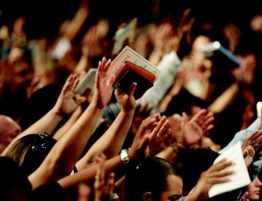
Modern revival movements, such as the Asbury Revival, Brownsville and the Toronto Blessing, have been infested by manifestations such as being slain in the Spirit (falling backward), holy laughter, holy rolling, carpet time, and uncontrollable shaking. This article investigates whether these manifestations are of God, the devil or human origin. I don’t focus on the Asbury Revival specifically, but what I share here can be used to test any move of God.
Main Points
-
- The Bible tells us what to expect when the Holy Spirit comes.
- Shaking, falling, laughing etc are not supported by scripture – at least not in context.
- These manifestations could be demonic, but most likely just emotional.
DOWNLOAD FREE CHAPTERS FROM OUR NEW BOOKS
Unscriptural manifestations
Michael Brown, in his noble defense of the revival movement [Michael Brown, Let no one deceive you], lists a number of scripture verses which he claims lend support to some of these manifestations. The following is a partial list. Hover over the verses to read them.
Shaking – Ex. 19:16-19; 20:18,19; 2 Sam. 22:7-9; Ezra 9:4; Ps. 2:16; 77:18-20; 96:9; 104:31-33; 114:7,8; Isa. 66:1,2,5; Jer. 5:22,23; Dan. 10:7-10; Acts 4:29-31; 16:25,26; Heb. 12:21.
Falling – 1 Sam. 19:23,24; John 18:3-12; Acts 26:12.
It should be rather obvious that none of these scriptures really support these manifestations.
The shaking to which the Bible alludes is a trembling for fear. This is totally unlike the uncontrollable shaking that occurs in revival meetings. Such manifestations are not Biblically substantiated.
The “falling” scriptures all occur with the enemies of God, not believers seeking a closer walk with Him.
The most prominent laughers in the Bible were Sarah (doubting laughter, Gen. 18:12-15), and God Himself, when He laughs in derision at the ungodly (Psalm 37:13; 59:18). In other places people laughed for joy very much in the same way people laugh today. The fact that the Bible uses the word laughter does not mean that it condones holy laughter. No where in the Bible did people ever laugh because they were uncontrollably filled with the Holy Spirit.
Scriptural Manifestations of the Holy Spirit
John 14:25; 16:13; Acts 1:8; and 1 Cor. 12 tell us what to expect when the Holy Spirit comes.
- He teaches,
- reminds us of Jesus’ words,
- guides us into truth, and
- empowers us for service.
A list of valid manifestations is given in 1 Cor. 12; and falling, holy laughter, holy rolling, carpet time, and uncontrollable shaking are not among them. True spiritual manifestations profit all in the congregation. This cannot be said of modern manifestations. Acts 2 & 4 give us examples of outpourings of the Holy Spirit. On both occasions when the revival occurred, the disciples went out and started preaching the gospel. They did not stay inside to get “drunk in the Spirit”.
Now is it possible that God would send these manifestations even though the Bible did not predict them? Of course it is possible. God could do whatever He wants. God could commit adultery if He wanted to. But God would not do that. There are many things God could but would not do because His nature dictates that He not do them. God has never moved contrary to His Word. Every move He has ever made has been predicted in advance (Isa. 46:10) just so that when it happened, we would believe (John 14:29). The Jews of Jesus day could not see that Jesus fulfilled the OT prophesies, but in hindsight, it is clear to all. With regards to modern revival manifestations, hindsight has not even proven that the Bible predicted them.
Where Do These Manifestations Come From?
If they are not from God, there are only two other possibilities.
- They could be demonic.
- They could be of human origin (emotional).
It is not surprising to find demons manifesting where the presence of God is. The behavior of the epileptic in Mark 9:18, 20 is not at all dissimilar to that of many in revival meetings. Such a coincidence could hardly be ignored. The demon possessed girl in Acts 16:17, 18 said all the right words, but was repetitive, redundant and annoying, and Paul was troubled by it. 1 Cor. 14:32 insists that the spirit of the prophets is subject to the prophets, meaning that any manifestation which is of God, can be controlled so order may prevail. Any manifestation that cannot be controlled is suspect.
These manifestations could also be purely emotional, caused by crowd effects. This may explain why these same people cannot reproduce the “same level of anointing” at home. But one thing is clear – the Bible does not teach us to expect them.
Having said that, it may be unwise to discard an entire revival movement because of these excesses. Many genuine revivals in the past have had their share of excesses. Even in the Corinthian church, where there was a genuine move of God, people abused the gifts. Paul wrote to correct their ignorance. He did not cast aside the entire revival. No move of God will ever be perfect as long as imperfect humans are involved.
Conclusion
Make no mistake about it, I am all in favor of dancing, singing, shouting, and vibrant praise and worship. This is Biblical. I remain a committed Pentecostal. I stress however that modern revival manifestations are not representative of core Pentecostalism, but rather extremes of fringe charismatic groups. A test question I have always asked is, “Did Jesus do that? Did Paul do that? What about Peter and the early disciples? Did they do it?” If not, then why do we?






